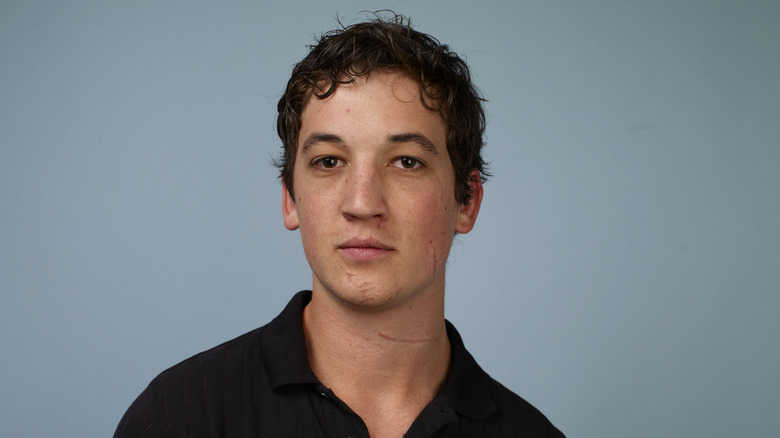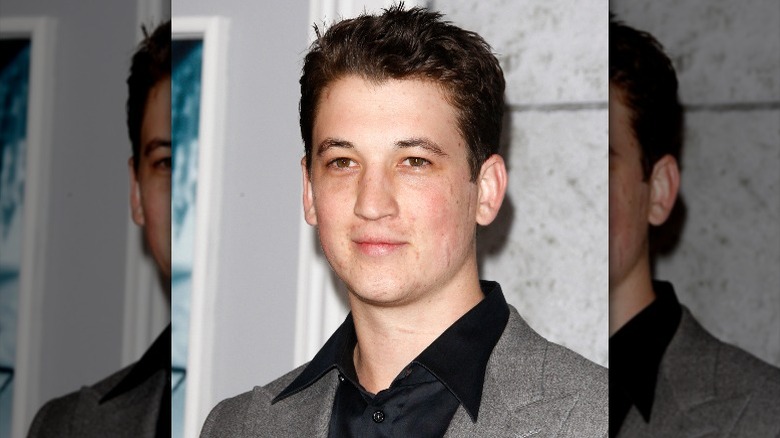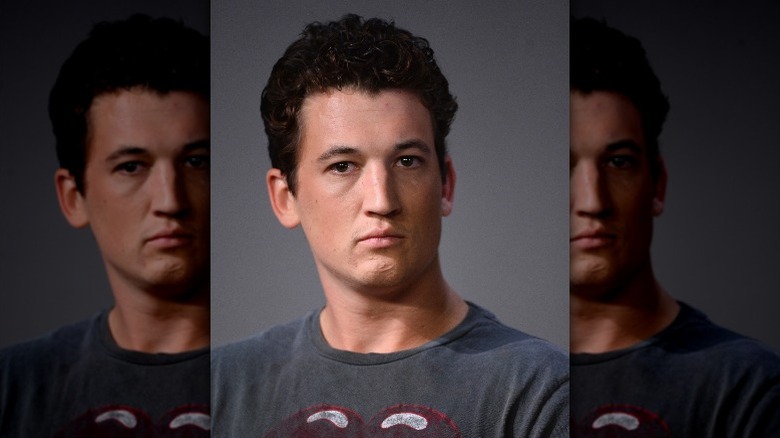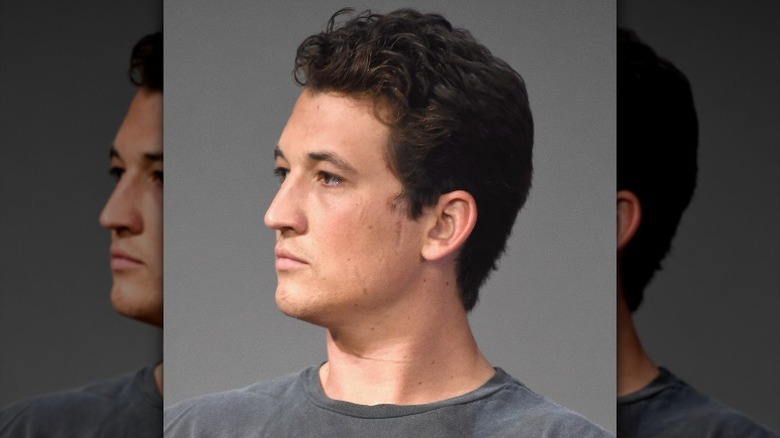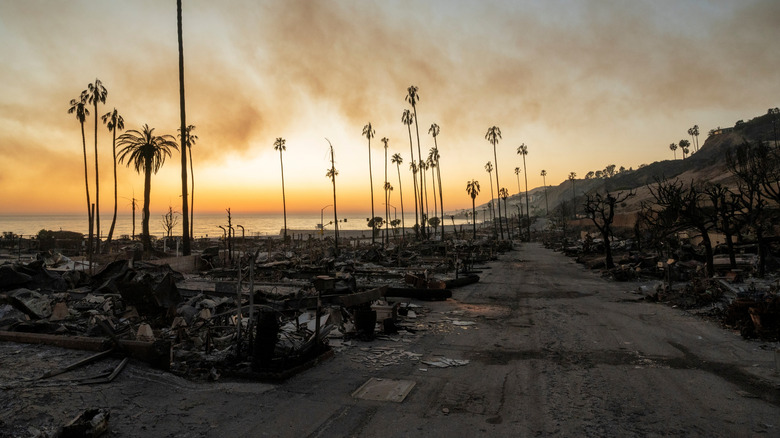The Tragedy Of Miles Teller Explained
We may receive a commission on purchases made from links.
If you've kept up with what Hollywood has looked like across different years, then there's a decent chance you're familiar with actor Miles Teller. After all, he's got a handful of critically acclaimed indie performances under his belt — 2014's "Whiplash," for example — and he's no stranger to big-budget movies, either. Look no further than 2022's "Top Gun: Maverick" for that one. Though that's not to say that he hasn't had his share of critical flops: The 2015 "Fantastic Four" reboot and the "Divergent" films, most notably, were widely regarded as terrible films despite also being blockbuster movies.
Despite his presence on the film scene, Teller's roots are considerably more humble. He was born on February 20, 1987, in Downingtown, Pennsylvania, and raised alongside his sisters, spending much of his childhood in central Florida. His youth is one that's probably pretty recognizable to anyone who grew up in a middle-class family — playing on local sports teams, participating in high school extracurriculars, attending homecoming dances, and the like. In interviews, Teller has leaned into his everyman roots, saying, "I was raised middle-class in a small town. I have all my same friends from high school ... So I want to feel people think I'm a man of the people. Because I feel that way" (via The Guardian).
Perhaps fittingly, by his own admission, he doesn't view himself as a tortured artist or anything like that, though that's not to say he hasn't experienced his own share of hardships and tragedies over the years.
He was in a horrific car accident
When it comes to major, tragic events of Miles Teller's life, the one you're likely to hear about most was the brush with death he had when he was just 20 years old. Back in 2007, he was in a car along with a couple of his friends, one of whom was at the wheel. The driver was speeding and lost control of the vehicle at around 80 mph, causing the car to flip several times. Teller was thrown from his seat and ejected through the window, landing on the street some 30 feet away from the vehicle, unconscious and covered in blood. Teller was the only person in the car who was so badly affected in the crash; both of his friends (the driver and another passenger) were relatively unscathed, as was a bag of tomatoes Teller had brought with him.
One of Teller's friends and the police initially thought the crash had killed him. As Teller has since explained, it almost should have. In his own words: "The EMT told me people in these kinds of accidents die 99.9% of the time" (via Men's Health). It obviously didn't kill him, though it did leave him badly hurt — a broken wrist, a shoulder injury that required 20 staples, and facial lacerations that required numerous laser surgeries over the course of multiple years. (The scars are still visible on his face and throat.) Pieces of gravel even remain embedded in his skin years later, as removing them would've caused even more serious scarring.
The car crash directly affected Miles Teller's career
Since the start of Hollywood, there have been plenty of discussions about the film industry and its unrealistic standards of beauty. It's unfortunately not a new tale for actors to be rejected for roles simply because they might not look the part.
That's the exact situation that occurred for Miles Teller in the aftermath of his 2007 car crash. When he would audition for roles, plenty of casting directors could see his strengths as an actor — would even openly admit to seeing that he could be perfect for a given part — but still refused to cast him, in large part due to the scars left on his face and neck as a result of the crash. "When I was first auditioning for projects, they'd say, 'Miles is a good actor but it doesn't make sense for this character to have scars,'" the actor told The Guardian in 2016.
And that remained the case for some time, though his fortunes suddenly reversed with his breakout role in 2010's "Rabbit Hole," in which the movie's director saw Teller's scars as a way to imply nuance in his character rather than as a hindrance. As the actor has explained it, "John Cameron Mitchell, the 'Rabbit Hole' director, he loved it. He was like, 'It's your character's secret!'"
The crash cost him some friendships
The car crash that Miles Teller survived back in 2007 ultimately had quite a number of long-lasting effects, many of them less than ideal, to put it lightly. Of course, there were the professional aspects to consider, with Teller's facial scars affecting his career as an actor, but the crash proved pretty consequential when it came to his personal life as well.
In an interview with Esquire, Teller explained that the crash ruined most of his college friendships. Regarding the driver of the car in the accident, Teller said that he never wanted to make that friend feel guilty over what happened; he recognized that, despite the consequences, it was just a mistake. As such, he did what he could not to bring the topic up or turn it into a point of contention, but the reality of the situation was that the surgeries he needed were expensive. Teller ended up suing his friend's insurance company — in the interview, he's careful to explain that he wasn't directly suing his friend — and that ruined everything. Facing increased insurance premiums, the driver of the car suddenly decided that he and Teller just couldn't be friends anymore; other members of Teller's social circle ended up following that friend's lead shortly after.
The whole thing came as a shock to Teller, who recalled the anger he felt toward his former friend: "I've never made you feel bad for this. For you to make me feel guilty and make me feel like you're the victim here, that's really f****d up."
Miles Teller lost two childhood friends in a short span of time
As it turned out, the 2007 car crash was only the beginning of a string of tragedies that Miles Teller would experience in a very short period of time. In speaking with The Guardian, Teller laid out the full timeline of those tragedies, starting with his own car crash, which took place in August 2007. In June 2008, one of his close friends suffered fatal injuries in a motorcycle accident; Teller was even there in the hospital, at his friend's side, when the family took him off of life support. Teller attended the funeral, and he recalled sitting next to another one of his good friends at the service, though neither of them knew that more tragedy was just on the horizon.
Barely a month had passed since the motorcycle accident when there was news of yet another car crash — fatal again, and this time involving the friend that Teller had been seated next to at the earlier funeral. In the interview, Teller sums up the whole situation simply, making it clear just how suddenly everything happened: "So at my 21st birthday, seven of my buddies are there, five months later, two of them are gone."
That wasn't the first time he'd spoken about those losses, however. In an interview with Esquire, he painted a tragic picture of what it was like to be in the hospital at the moment of a friend's death: "I was in the hospital when they pulled the plug on my one friend. I knew what it felt like to hug a mother the day she lost her son."
An unflattering article about him went viral
If you were keeping up with celebrity drama back in 2015, then you might have heard about Miles Teller, albeit not necessarily in the best light. The simple reason why that might be the case has to do with an article written about him that went viral. That article was published in Esquire, and its author opens with a thought that is less than flattering, to say the least: "You're sitting across from Miles Teller at the Luminary restaurant in Atlanta and trying to figure out if he's a d***." The rest of the article reads in a similar manner, often taking on a mocking tone when discussing Teller's bluntness, confidence, or general opinions on the world and his experiences. The article's author repeatedly comes to the conclusion, "So yeah, he is kind of a d***" (or some variation of that sentiment).
That opinion of Teller has managed to persist over the years, and it hasn't sat especially well with him. A year later, he spoke with The Guardian about the whole incident, saying, "Oh, I felt frickin' helpless, I felt extremely misrepresented, I felt a little angry." Even in 2020, while talking with Men's Health, the question of that Esquire article cropped up, to which Teller responded, "It was frustrating because my parents always told me the one thing you take to the grave is your reputation." It ultimately turned into a long-lasting impression, and one that, according to Teller, stemmed from nothing more than a misinterpretation of his sense of humor.
Miles Teller has made the news for unfortunate reasons
Miles Teller's relationship with media outlets has been a bit rocky — something that's been noted in various publications, even years after his notable encounters with the press. Of course, there was the 2015 Esquire interview that didn't exactly do wonders for his reputation, but there have been a couple other times when Teller's name has cropped up in conversation for unfortunate reasons.
Back in 2017, Teller was in San Diego, California, to visit a friend, but the trip took a turn when news outlets got word that he'd been arrested for public intoxication. Allegedly, he'd been inebriated to the point of not being able to clearly speak or walk, and the arrest came after he'd been taken to a detox center, where he proved uncooperative with the staff. Teller later took to social media to explain that he hadn't been arrested — just detained — though his story didn't match with what the San Diego Police Department had apparently told various media outlets.
Teller was once again in the news in 2021, this time in relation to the COVID-19 pandemic. The tabloid Daily Mail published an exclusive in which they claimed that Teller had refused to get vaccinated or take a COVID-19 test, only to test positive on the set of "The Offer," temporarily shutting down production. The speculation became more complex despite Teller's publicist denying the rumors, and the actor eventually posted on social media that he was, in fact, vaccinated and had been for some time.
Miles Teller lost his home in the Los Angeles fires
In January 2025, Miles Teller and his wife, Keleigh, lost their home in the Pacific Palisades fire, one of two immensely destructive wildfires that swept through the Los Angeles area that month. On January 10, Keleigh took to Instagram to share a blurry photo of the home, taken through a car window as the couple evacuated their property. Another, now-deleted photo showed what was left of the house, which had been reduced to rubble.
In February, Teller spoke to E! News about the support he and Keleigh had received from friends and family in the wake of the fires. "Many people have reached out, just either letting us know that they're there emotionally or people are offering us their place," Teller said. "You lose your home, you're part of a club nobody wants to be a part of."
All told, the fires killed 29 people, destroyed an estimated 16,000 structures, and caused economic losses in excess of $250 billion. Other celebrities who reportedly lost homes in the disaster include Julia Louis-Dreyfus, Cary Elwes, Anthony Hopkins, and Jeff Bridges.

